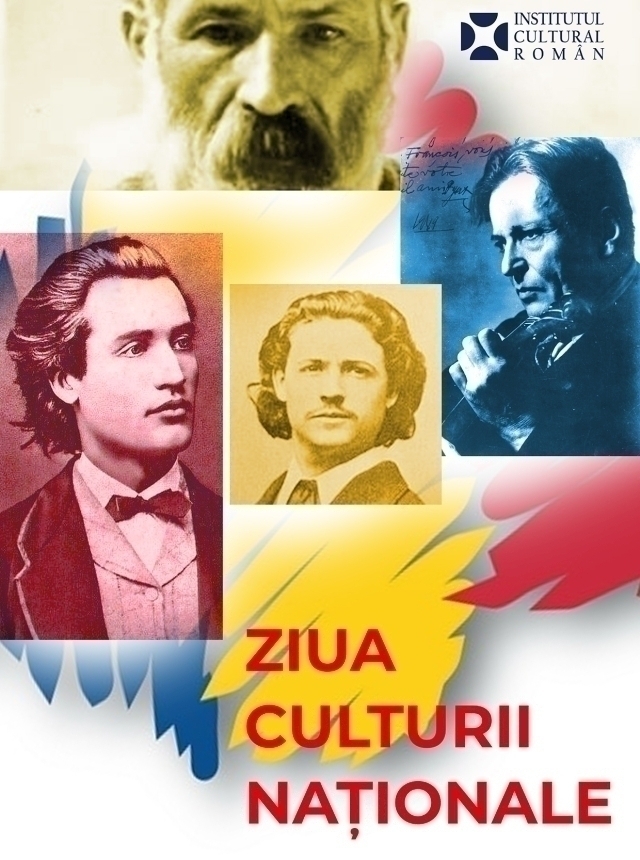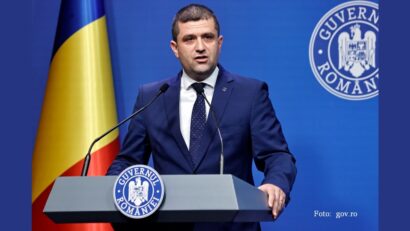About Culture in the year marking the Great Union Centennial
Declared National Culture Day in 2010, January 15, the birthday of the Romanians national poet, Mihai Eminescu, is being celebrated these days, in correlation with the symbols of the Great Union Centennial

Corina Cristea, 19.01.2018, 14:20
Many events are being organised across the country and abroad but it is also a moment to bring to the forefront problems the cultural sector in Romania is faced with. The guest of Radio Romania, Alin Ciupală, a professor at Bucharest University, has explained why a National Culture Day is needed:
Alin Ciupala: “We need a day to remember about our national culture, to remember that we are Romanians, but I believe that what we do for Romanian culture nowadays is far more important than the moment proper. Either we’ve realised it or not, either we’ve had a contribution or not, we have reached a new stage in our history, a post-national stage, so to say, due to Romania’s EU integration. This doesn’t mean however that we could or should forget who we are. To use a consecrated phrase, the European Union doesn’t want us to be citizens of nowhere. It wants us to be there as Romanians, but it depends on us to what extent we manage to realize that we are Romanians and not only Europeans. To what extent can we do something concretely to preserve this national identity, in the context in which we are living in a global world, at a time when there is free circulation, values and not only foodstuffs from all over the world are now reaching Romania. And I believe that first of all it is a problem of ours”.
The Romanian culture is a very, very delicate system. It is a system which manages to adapt itself, in spite of more or less inspired public cultural policies, says professor Ciupală, because Romanian culture is incredibly valuable, very important, it is also present abroad, and this has nothing to do with the cultural policies pursued in Romania. It is an authentic Romanian culture, which is not subsidized by the Government, no matter who is in power.
“I have not seen one single party that could come up and say — Wait a minute, culture is a pivotal element of the national identity. What are we to do with it? We need to have our own policy with respect to our own culture. We need to have a country project so to say. Romanian culture is entirely the Romanians’ responsibility, it is the responsibility of those who rule this country, it is the responsibility of politicians, first and foremost. But, unfortunately they ignore it.”
In turn, academician Eugen Simion has stated that politicians should get involved in order to preserve national identity.
National cultural identity is not to be marginalized, once Romania continues its European journey, Romania’s president Klaus Iohannis has stated in his address on National Culture Day. In his message, Iohannis has also cautioned against a worrying situation. Speaking about that, here is President Iohannis himself.
Klaus Iohannis: “One third of Romanians does not even read a book a year. Our country is deprived of cinema halls while the Romanian language is the orderly victim of the public discourse. At the Centennial anniversary, Romania will also have to set the task of a great union around its own culture. The great cultural bilateral projects that are to mark the years 2018 and 2019, as well as the European Union’s presidency, are good opportunities for us to embark upon such a journey. It is not an easy task, but the implementation of such projects may prove Romania’s capacity to bring added value to the European project, through its own culture.”
The Romanian Academy has celebrated the National Culture Day through a symposium themed “Celebration Time for Romanian Culture — the Centennial of the Great Union”, while the representations of the Romanian Cultural Institute abroad have scheduled a great number of cultural manifestations, such as poetry recitals, concerts, exhibitions, stage performances, literary events, film screenings and conferences.
Events these days target the National Culture Days, also marking the debut of an ample series projects highlighting the Centennial of the great Union. We recall that the Great Union is the historical process through which in 1918, all provinces inhabited by Romanians got united, within the borders of a single national state, Romania.
The Great Union’s preceding stages were the 1859 Union of Wallachia and Moldavia, as well as the gaining of independence in the wake of the 1877-1878 Independence War. All these accomplishments were possible against the backdrop of the Romanians’ 19th century revival. The union of Bessarabia, Bukovina and eventually, the union of Transylvania with the Romanian Kingdom, the so-called Old Kingdom, lead to the formation of Greater Romania. A united Romania was its people’s main reason to fight for the Entente in World War One.






























